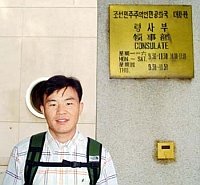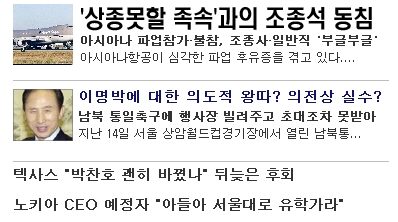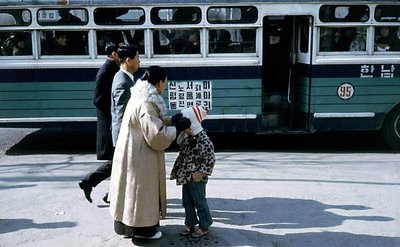The North-South questions in the Korean peninsula are still not going to be a frequent stuff at this site, but this one case of a Northern settler in the South is something special, so I'll have a go on him. (Is there a saying like that in English?)

Mr Kim on front of the DPRK embassy in Beijing. (Linked from Kyunghyang Sinmun.) |
Kyunghyang Sinmun tells of a North Korea born man, who has had the nerve ("big liver") to go to the DPRK embassy in Beijing and file a request to be allowed to travel to see his family remaining in North Korea. Kim Hyông-dôk (32) told that on the 5th of August he went to the consulate of the North Korean embassy in Beijing and made a requested to the party and the government to allow also Northern refugees (t'albukcha) to meet their families legally.
"At first when I disclosed my identity, they talked to me in their particular rude (kôch'ilda) manner, but it was nothing I couldn't take. And he promised to report my request to his superiors."
This Mr Kim is the same man who went to the Kumgangsan tour with his wife and children as a first Northern-born person, and wrote about it for Hankyoreh 21
The police processed his application for a visit to DPRK and apparently saw no problem in allowing him to go to North. Later it turned out that the police authority responsible for Kim's personality check had made a mistake in showing green light for his visit. When Kim was already in the North, the Ministry of Unification and the National Institute of Security had emergency meetings to prepare for the actions of the "irrigated" DPRK. The authorities also learned that Mr Kim was going to write about his visit for Hankyoreh 21, and contacted the responsible reported and requested that the article be not printed. From the afterword of the article:
After one week, on July 19, I and the chief editor got calls from a government official. He said that he had heard Mr Kim was writing a story about his visit to Kumgangsan, and requested that the story not be printed. "If the North Korean authorities learn that a refugee who left North because of not liking the place has made a visit there, it can be harmful for the improved South-North relations. It can irritate (chagûkhada) the North. And if many Northern refugees start applying for the Kumgangsan tours, it can cause trouble between South and North and distruct the Kumgansan tourism."
To its credit, the mag decided to print the story, which was nothing extraordinary as far as Kumgangsan tours are concerned (in my understanding), except for the special insights of a DPRK-born person. As for the disclosure of his background, he ended up revealing it in the discussions with the personnel in a beer house. "Oh, you're a national traitor (minjok panyôkcha)" was their reaction, apparently without hostility as a learned expression. He describes the North Korean workers in the tourist zone as well toned in the official DPRK line as well as curious about the conditions in the South. There was one personnel overseer (?) with whom he had longer discussions. When asking him what he'd like to get as a present from the South next time he comes back, he requested a laptop computer. I told him that because it takes one month's salary for an average wage earner, giving laptops as presents is possible only for the rich. "But this one Southern hyôngnim ("older brother", South Korean tourism entrepreneur) visiting here often told he makes 50000 dollars a month, and I asked him to bring me a laptop, but I haven't heard from him since. He must have been only bragging."
Funny that the ROK officials should get more agitated and panicked over a DPRK refugee's visit to Kumgangsan than their DPRK counterparts. Shows after all what kind of nation they think North Korea is... I appreciate the attitude of this Mr Kim: doesn't try to provoke anyone but does what is at first thought unthinkable. Isn't that where a change can start from? |





 I admit that sometimes I browse for Korean news just to see what they write about my country - the small nation symptom - but this time I didn't need to. Not only
I admit that sometimes I browse for Korean news just to see what they write about my country - the small nation symptom - but this time I didn't need to. Not only 


